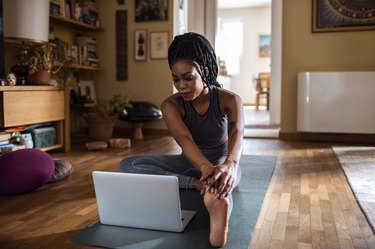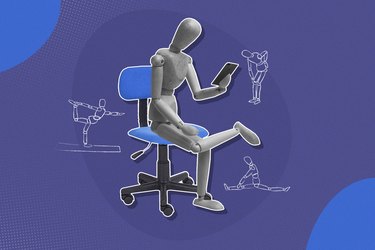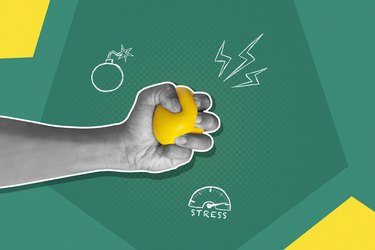
Since the start of the COVID-19 pandemic, many of us have begun working from home, where we'll be for the foreseeable future. But about one in eight Americans live in apartments, which can make it a lot harder to craft your own office space.
The result? You're often forced to turn your bed or couch into a makeshift home office.
Video of the Day
Video of the Day
But while occasionally doing this is fine, if it becomes your routine all day every day, it can start to affect both your physical and mental health, Paul Greene, PhD, director of the Manhattan Center for Cognitive-Behavioral Therapy in New York City, tells LIVESTRONG.com.
Read on to discover how working from your bed or couch affects both your mind and body, and how to make it healthier if it's your only option.
1. Your Back (and Backside) Might Ache
If you're just sitting on your bed without good back support, it seems obvious that your back would start to hurt. But your hips and even your butt may as well.
"You have no place for your legs, so they have to be extended in front of you or crisscrossed, which puts strain on the sacroiliac joint that connects your spine to your hips," explains Theresa Marko, PT, owner of Marko Physical Therapy in New York City.
Since muscles in this position are also bent, or flexed, they'll become stiff and tight and may even shorten over time, "kind of like if you wear high heels every single day," Marko adds.
The couch can also cause back pain, but for a difference reason: It's very low to the ground, which strains your lumbar spine.
2. Your Neck and Shoulders May Feel the Strain

"If you are using a laptop, you are probably sitting on the edge of the couch or bed with the laptop on your lap or on a coffee or side table," Marko says. "This causes you to slouch, rounding your spine and shoulders and pushing your head forward so that your head and neck stick out like a turtle's."
This puts all sorts of pressure on your neck and upper shoulder muscles.
"Take a finger and bend it backwards — while it doesn't hurt right away, it will after an hour," Marko says. "That's exactly how your poor neck feels."
3. Your Jaw Could Tense, and Your Teeth Might Suffer
This poor posture may actually be wrecking your teeth, too. There's been an uptick in dental patients with cracked teeth since the start of the COVID-19 pandemic, notes John Nale, DMD, MD, of Carolinas Center for Oral & Facial Surgery.
The nerves in your neck and shoulder muscles lead to the temporomandibular joint (TMJ), which connects to your jawbone and skull. Poor posture and slouched sitting from the pelvis up results in a forward head posture, curving the spine in a "c shape," as a way for the body to balance itself out naturally. This posture creates tension on the muscles attached to the jaw, creating jaw pain, facial swelling and migraines.
4. Your Wrists May Throb
If you're working from your bed or couch, you most likely are placing the mouse for your laptop on a side table, and resting your wrist right on the table as well. But this can inadvertently decrease blood supply to your hand and compress nerves, which may lead to carpel tunnel syndrome, says Jeffrey Goldstein, MD, an orthopedic spine surgeon with NYU Langone Health in New York City.
Other Effects of Working This Way

1. Your Risk of Disease Might Increase
Any extended periods of sitting — including at your bed or couch — can be harmful to your overall health.
An October 2018 study published in the American Journal of Epidemiology followed over 125,000 men and women for 21 years and found that those who sat more than six hours a day had a higher risk of death from all causes, including heart disease, cancer and kidney disease.
One reason may simply be that the more sedentary you are, the more likely you are to gain weight, which is a risk factor for many of these diseases, Dr. Goldstein points out. Another theory is that it alters levels of certain hormones in your blood, such as insulin, which in turn can raise your risk of disease.
2. Your Sleep May Suffer
"Our minds associate places with activities, so if you work in bed, it's likely to interfere with your sleep sooner or later," says Greene.
This is because your body will start linking your bed to work, confusing sleep mode with work mode and all of its attending stressors, which makes it harder to nod off.
3. Your Productivity Might Plummet
If you're working from your bed or couch, it may be easier to slide into other behaviors, like not showering and staying in your pajamas for most of the day (if you bother changing at all).
"Part of the benefit of working in an office, or an office-like environment, is it forces your mind to go into work mode, which helps you concentrate and be more productive," explains Greene.
But if your office is now where you sleep or veg and watch Netflix, it can be harder to stay motivated.
Related Reading
6 Tips for a Healthier Work-From-Home Strategy

1. Take Frequent Breaks to Get Your Body Moving
The Mayo Clinic recommends taking a break from sitting every 30 minutes. One option is to do a quick jog up and down the stairs to loosen all your muscles and joints.
Neck and jaw stretches also can help ease tense facial muscles. Try these:
- With your shoulders back and chest up, pull your chin down and back, creating a "double chin." Hold for three seconds and repeat 10 times.
- Place your thumb under your chin and open your mouth slowly, pressing gently against your chin for resistance. Hold for five seconds and then close the mouth slowly.
- With your tongue touching the roof of your mouth, slowly open and close your mouth.
- Place a small object between the front teeth (a toothbrush will work). As you maintain bite on the object, move your jaw from side to side.
2. Invest in an Inexpensive Tray Table
This will help bring the computer towards you and closer so you don't slouch, says Marko. (You can prop it up on top of a pillow to raise its height if it's otherwise too low.)
3. Pad Up With Pillows
If your de-facto office is your home or couch, pillows are your new best friends, says Marko.
First, sit on a pillow — preferably a big fluffy one — to raise up your butt: "It will open up your hips a bit, so that there's less strain on your back," she explains.
If you're on a couch, also place a pillow behind you to support your back. While you're at it, invest in a pillow pad for your laptop or tablet too (like this one, $19.99 at Bed, Bath and Beyond). This will help prop it up so that the top is a little below your eye level.
"You want it set up so that you can comfortably reach your keyboard with T-rex arms — your upper arms glued to your ribcage," explains Kate Ayoub, PT, DPT, MPH, a physical therapist and certified ergonomics health coach in Washington, DC.
4. Create Your Own Standing Desk
You can take a break from sitting (and mitigate many of its negative health effects) by switching to a standing desk model, advises Marko. Simply switch to working at your kitchen counter or bedroom dresser. Alternate between an hour of sitting and 30 minutes of standing. If you have a breakfast bar with stools, you can also try sitting there once or twice a day.
"Since stools don't have backs, it'll force your body into active sitting, which strengthens your back and core, as opposed to supportive sitting," says Marko.
5. Invest in a Wireless Keyboard and Mouse
Laptops weren't designed to be used for full workdays — they were designed for portability, says Ayoub. Why does that matter?
"If your arms and wrists are in a good spot, your head will be bent to see the screen, but if you raise the laptop to put your head and neck in a good position, the muscles in your shoulders and wrists will be overworking and probably cause some pain," she explains.
If you have a wireless keyboard (like this one, $24.99 from Staples), you can position it how it's ergonomically best for you.
6. Symbolically Separate Your Workspace
In a perfect world, you'd have a whole room, or at least a corner of it, that would be designated as your home office, says Greene. But if you live in cramped quarters or with a lot of people, that's not always realistic.
If you must work from your bed or sofa, Greene recommends finding some way to designate it as a workspace for several hours of the day — for example, taking all your bedroom knickknacks off your bed and night table and replacing them with work supplies such as pens, paper clips and staplers.
Another must do: Change out of your pajamas before the start of the work day.
"If you can set up a whole morning routine — you get up, get dressed and then go out to Starbucks for a coffee — it will help propel you into work mode," Greene says.
- National Apartment Association: United States Needs 4.6 Million New Apartments By 2030 or It Will Face A Serious Shortage
- American Journal of Epidemiology: Prolonged Leisure Time Spent Sitting in Relation to Cause-Specific Mortality in a Large US Cohort
- Mayo Clinic: What Are the Risks of Sitting Too Much
Is this an emergency? If you are experiencing serious medical symptoms, please see the National Library of Medicine’s list of signs you need emergency medical attention or call 911.


